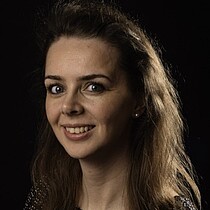

Article: Monday, 24 November 2025
From 24 November, women in the Netherlands effectively work for free for the rest of the year. It’s Equal Pay Day in the Netherlands – the day when it’s calculated that the average wage that women earn still lags behind that of men. Associate Professor Khadija van der Straaten in the Department of Business-Society Management at Rotterdam School of Management, Erasmus University (RSM) conducts research into gender inequality in the business world. Among other things, she looks at the wage differences between men and women. “What really helps is to take a critical look at how we favour men and actively dismantle that.”
There are two definitions of the pay gap: the unadjusted difference (the average pay difference between groups, for example between men and women), and the adjusted pay gap, which takes into account factors such as age, experience and seniority. In the Netherlands, a pay gap of more than 5 per cent for comparable work is, in principle, illegal.
Van der Straaten became interested in the gender pay gap at an early age, a topic that she believes provokes a lot of discussion. “There are many opinions on the subject, but also many unfounded opinions. That is precisely where science can make an important contribution,” she says. This curiosity prompted her to delve deeper into the subject. “Based on the facts, you can demonstrate that a pay gap does indeed exist.”
Her research shows that policies specifically targeting women often do little to break through positive biases towards men and male corporate culture. “Many policies are based on the idea that women are at a disadvantage, that they need to learn to negotiate or be more assertive. But what we forget is that some men actually gain an advantage,” she explains. According to Van der Straaten, this inequality is deeply rooted in how organisations function and in what we consider to be ’normal’ behaviour in the workplace.
According to Van der Straaten, it is important to also investigate where this advantage comes from. “In organisations, we see that men are often systematically overestimated. The more someone fits the classic image of masculinity, for example, being confident, rational, heterosexual, the more responsibility and salary he receives. That image of the ‘ideal leader’ is still very masculine.”
This leads to women being assessed differently on a structural basis. “A man who performs slightly less well is less likely to be penalised”’ she explains, “whereas a woman in the same situation is more likely to be seen as unsuitable.”
That is why policies that focus exclusively on women often backfire, according to Van der Straaten. “You reinforce the idea that women are a problem that needs to be solved,” she says. “We organise a lunch or training session for women, but we don't change the prejudices in the system itself. What really helps is to take a critical look at how we favour men and actively dismantle that.”
According to Van der Straaten, transparency is the first step in tackling inequality: “Every company can investigate the size of the pay gap and how promotions are distributed. Without facts, it remains a matter of opinions such as ‘It's not so bad at our company’, but as soon as you put the figures on the table, the conversation becomes concrete.”
The next step is to reduce unfair advantages. “It is not the responsibility of women to catch up,” she says. “Organisations must ensure that everyone has equal opportunities for equal performance. And if it turns out that women are systematically rated lower, then you have to take that into account in promotion decisions.”
In early 2025, Erasmus University Rotterdam (EUR) published a comprehensive report on a study into the pay gap among its employees, conducted by Bureau Pouwels. In addition to gender, this study also focused on nationality and covered both academic staff and employees in professional services. The study is unique in that it also focused on nationality and professional services. Both the adjusted and unadjusted pay gap were examined.
The main findings revealed a significant unadjusted pay gap of 15% in favour of men. In addition, there appeared to be an unadjusted pay gap of 6% in favour of Dutch employees. When gender and nationality are combined, international women earn 20% less than Dutch men, Dutch women earn 15% less, and international men earn 6% less.
After adjusting for factors such as job profile, job level, age, FTE, and contract type, the pay gap for all groups appears to be less than 5%, indicating that there is no unlawful difference. Nevertheless, the difference remains undesirable, as it shows that women and international employees often hold lower positions compared to Dutch men.
In addition, Bureau Pouwels also analysed additional remuneration such as allowances and bonuses. This revealed that men receive additional remuneration almost twice as often as women, and that these payments are on average 50% higher. Dutch employees also receive additional remuneration more than twice as often as their non-Dutch colleagues.
This report offers valuable insights and calls for further reflection and action to reduce the pay gap and promote equal opportunities within the university. This could include drawing up guidelines for remuneration, focusing more closely on the grading of certain positions in order to reduce the scope for negotiation, and raising awareness among management/recruiters about inclusive recruitment and selection. EUR has already started working on this.

Van der Straaten was recently awarded a Veni grant for a new project on gender inequality in international value chains, in which she examines the position of women in industries such as textiles and electronics in South Asia.
“In those sectors, women sometimes earn only half of what men earn in the same position,” she says. “Wages are so low that they remain financially dependent on their male relatives. In addition, they often face sexual violence, and women have little chance of reaching leadership positions.
“This is a serious issue. We are all aware of child labour, but gender-based violence is the most significant human rights violation worldwide, and you hear much less about it.”
Addressing such inequality is complex, says Van der Straaten. “Gender norms are deeply rooted. Companies can develop internal policies, but they operate in societies where inequality is ingrained. That makes change difficult – but not impossible.”
Van der Straaten notes that the discussion about the pay gap regularly comes up outside of her research as well. Opinions differ, even at birthday parties, for example. And not everyone bases their opinions on facts, Van der Straaten notes. 'I always wait to hear someone's position and what arguments they use. The advantage is that I know the facts. If someone says there is no pay gap, I can explain that this is not true if you look at the research. And if someone says it is because women are more likely to work part-time, I explain that the gap remains even when you correct for that. In my role as a scientist, I can refute that quite easily.'
She does not shy away from the conversation. “At birthday parties, I often hear men say ’They preferred a woman, so now I have less chance of promotion.’ Then I say ‘you had the advantage 99 times out of 100. Now that the advantage lies with a woman, it feels uncomfortable. But if a woman, and this is even more true for women of colour, achieves the same position despite all the barriers, then objectively speaking she is probably even better. After all, she had to overcome many more hurdles to get there’.”
According to Van der Straaten, the pay gap is not just a matter of money, but a symptom of deeper inequality. “It is an easily measurable outcome of something that goes wrong much earlier in the process: who gets opportunities, who is seen as competent, who gets the benefit of the doubt.”
She is concerned to see discussions about gender inequality increasingly dismissed as ‘woke’ or exaggerated. “There is a growing counter movement that says it's all untrue,” she says. “But the facts don't lie. Inequality exists – not only in the Netherlands, but worldwide.”
This denial of inequality causes her particular concern when it comes to young people. She cites the growing Andrew Tate movement as an example. “I had hoped and thought that the younger generation would be aware that inequality exists, rather than simply denying it outright.”
According to Van der Straaten, clinging to traditional gender norms negates much progress. “You perpetuate a system that is not only about men earning money and tradwives, but also norms that lead to harmful situations for both men and women.” She argues that the problem arises when those norms are presented as the only option. “Promoting ‘this is how it should be’ and a one-dimensional idea of masculinity, which most men cannot live up to, is harmful to both men and women. It feels like we are going back in time. And I find it painful to see that some young people think this way. After all, they are the future.”

In collaboration with Erasmus School of Economics (ESE), Erasmus Q-Intelligence has developed an integrated approach to researching wage differences. Erasmus Q-Intelligence is affiliated with the Econometric Institute of ESE and has conducted research into the pay gap between men and women at housing association Woonstad Rotterdam, among others. Their research measures both the unadjusted pay gap and the adjusted pay gap. The adjusted pay gap at Woonstad Rotterdam is below the 5 per cent criterion set by EU guidelines. “Although these percentages are manageable, they do indicate that there is room for improvement,” says Woonstad Rotterdam. “That is why we immediately requested an in-depth follow-up study to gain even more insight into the specific areas where the pay gap exists.”


Science Communication and Media Officer
Rotterdam School of Management, Erasmus University (RSM) is one of Europe’s top-ranked business schools. RSM provides ground-breaking research and education furthering excellence in all aspects of management and is based in the international port city of Rotterdam – a vital nexus of business, logistics and trade. RSM’s primary focus is on developing business leaders with international careers who can become a force for positive change by carrying their innovative mindset into a sustainable future. Our first-class range of bachelor, master, MBA, PhD and executive programmes encourage them to become to become critical, creative, caring and collaborative thinkers and doers.
